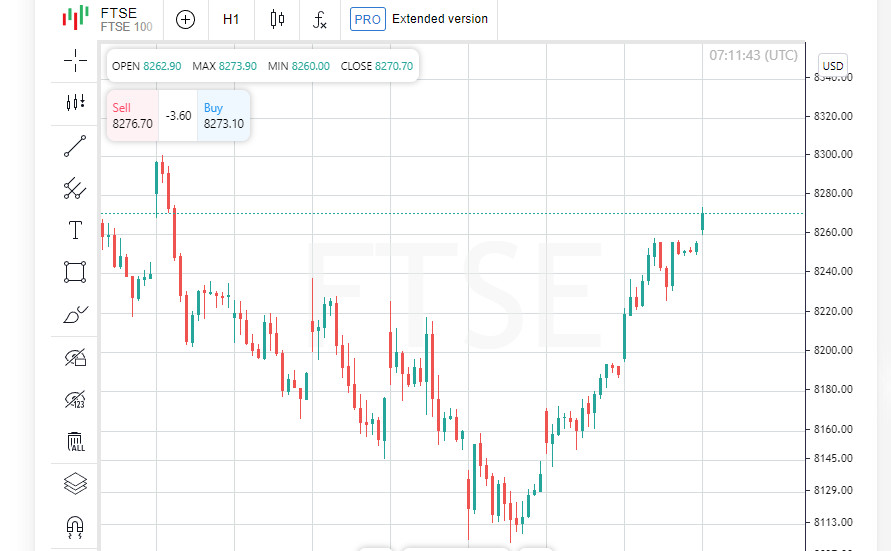
European stocks rose on Thursday, as hopes for a US interest rate cut were fuelled by weak economic data. London markets also showed positive momentum as voting began in the UK general election, where polls predicted a historic victory for the Labour Party.
The pan-European STOXX 600 index (.STOXX) rose 0.6%, hitting a more than one-week high.
The UK's FTSE 100 index (.FTSE) rose 0.8% as investors waited to see how much of a majority the Labour Party could secure.
"The UK election result, which many expect to go in Labour's favour, will not have a significant impact on markets unless there is a big surprise, as they are already pricing that scenario in," said Bas van Geffen, senior macro strategist at Rabobank.
French shares (.FCHI) rose for a second day in a row, up 0.8%, as opponents of France's National Rally (RN) struggle to keep the far-right party out of power.
A poll on Thursday showed that France's National Rally is unlikely to win an outright majority in the second round of parliamentary elections on Sunday.
The European lenders sub-index (.SX7E), which includes French banks Societe Generale (SOGN.PA) and BNP Paribas (BNPP.PA), rose 1.3% on the news, leading the sector.
Germany's industrial orders unexpectedly fell in May, while a separate report showed inflation in Switzerland eased last month. This has reduced market expectations that the central bank will cut interest rates again this year.
Meanwhile, European Central Bank officials were largely confident of further inflation cuts, although some were hesitant about the previous rate cut due to a host of headwinds, as confirmed in the meeting reports.
Among individual stocks, shares in Britain's Smith & Nephew (SN.L) rose 6.8% after activist investor Cevian Capital said it had acquired a 5% stake in the medical equipment maker.
France's Pluxee (PLX.PA) fell 9.2% after reporting weaker-than-expected third-quarter sales in Europe on Wednesday.
Sweden's Ericsson (ERICb.ST) fell 1.2% after announcing it would write down an SEK11.4 billion ($1.09 billion) impairment charge for the second quarter of 2024.
Trading activity was thin due to a bank holiday in the US.
The pound held its ground and UK stocks were set to rise on Friday after the centre-left Labour Party's landslide victory in the general election boosted investor confidence after a period of market volatility.
As of 06:00 GMT on Friday, Keir Starmer's Labour Party had won 405 of the 650 seats in parliament, giving it a large majority, with results in several seats still pending.
Conservative Prime Minister Rishi Sunak conceded defeat.
Sterling strengthened slightly after exit polls were largely confirmed, and was last trading at $1.2767. Sterling was little changed against the euro at 84.75 pence.
The pound began to strengthen after Sunak unexpectedly called a snap election at the end of May. Sterling has been the biggest gainer against the dollar this year, up 0.3%.
Reflecting this sense of confidence ahead of the election, the premium investors demand for the added risk of holding UK gilts over Germany's top-rated 10-year bonds has remained steady this year at around 160 basis points, well below the 230 basis points seen during the 2022 mini-budget crisis.
UK stock indices (.FTSE) have hit record highs this year, driven by a slowly growing but relatively stable economy and slowing inflation.
The UK has seen the highest inflation and interest rates in the developed world over the past couple of years. Yields on 10-year UK government bonds have risen to around 4.2% this year as investors have sold debt on the belief that lower UK interest rates will take longer than previously expected.
The Bank of England is expected to cut interest rates at either its August or September meetings. Analysts believe investors will react quickly not only to the outcome of Thursday's election but also to future monetary policy.
High inflation and interest rates are having a significant impact on the UK economy. Bond yields reflect market expectations for future interest rates, and the rise to 4.2% suggests investors are anticipating a longer period of high borrowing costs.
Economists and analysts are closely monitoring the Bank of England's decisions, expecting a possible rate cut in the coming months. These decisions will be critical to the future economic developments in the country, influencing sentiment in both domestic and foreign investors.
 English
English 
 Русский
Русский Bahasa Indonesia
Bahasa Indonesia Bahasa Malay
Bahasa Malay ไทย
ไทย Español
Español Deutsch
Deutsch Български
Български Français
Français Tiếng Việt
Tiếng Việt 中文
中文 বাংলা
বাংলা हिन्दी
हिन्दी Čeština
Čeština Українська
Українська Română
Română

